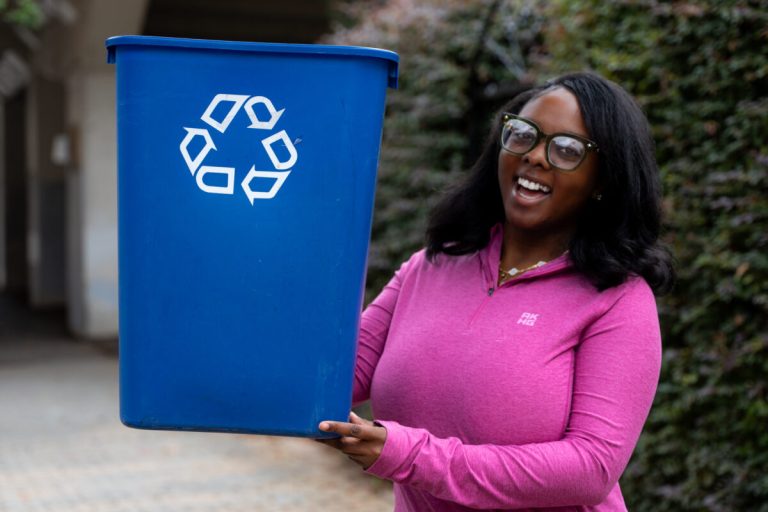Reviewed by: Pat Byington
“Killer bees” in Alabama? Here’s what to know + how to protect our native pollinators
Reading time: 5 minutes

The Alabama Department of Agriculture and Industries (ADAI) has confirmed the presence of Africanized honeybees—aka, “killer bees”—in Alabama’s St. Clair and Jackson counties. While the name might sound dramatic, but there’s no need to panic. We spoke with local experts from Birmingham Botanical Gardens and Foxhound Bee Company to get the facts on why this breed isn’t a threat and how you can help protect our native pollinators during a time when they need it most.
What to know about Africanized honeybees, aka “killer bees”
When a phrase like ‘killer bees’ buzzes through your social feed, it stings your curiosity. Especially when you hear things like they attack in large swarms and chase people, animals and even cars for up to a mile.
Fortunately, this isn’t the straight-to-TV movie plot it sounds like. So, why are Africanized honeybees being spotted in Alabama?
Technically, “killer bees” aren’t new to the hive. They are a mix of African and European bees that made their first appearance in the United States in the 1990s.
While the species has now been spotted in at least 13 states, it wasn’t until 2024 when they began buzzing into Alabama.
“In 2024, two isolated colonies with Africanized traits were found in Alabama—both in different areas, unrelated and caught early thanks to responsible beekeepers who called state inspectors.
Auburn University’s Bee Lab confirmed the genetics, and both colonies were destroyed. These weren’t public threats, just rare cases that were handled quickly and professionally.”
Adam Hickman, Owner + Master Beekeeper, Foxhound Bee Company
The scoop on pollinators

Native pollinators include a long list of bees, moths, butterflies and more. For this story, we’ll divide them up into two types:
- European honeybees—gentle + make delicious honey
- Native bees + pollinators—vital for crops + flowers
Fun fact: Native bees are much more effective pollinators than honeybees!
In an article by Almanac.com, “native bees are the super-pollinators of the garden! While honeybees have their place, it’s actually these solitary bees, such as mason bees and leafcutter bees, that are critical to growing food and flowers.”
Why native pollinators need our help


(L-R) Honeybee on native mountain mint and bumblebee on native stokes aster (Bham Now)
Currently, the U.S. is facing a crisis with our native pollinators, causing them to be in decline and an urgent need of urgent protection. Also, with honeybees being in massive decline, our native bees—the VIPs of pollinating—are being leaned on heavily.
The term “killer bees” doesn’t help.
“The term ‘killer bees’ just stirs up fear. What we’re really talking about are bees with more defensive behavior—not some aggressive swarm hunting people. Honeybees die after stinging you, so it is only a last resort for them.
Honeybees, like dogs, come in different breeds. Some breeds, like Italian honeybees, which are what most beekeepers have, are naturally easy to manage, just like a golden retriever is usually friendly.
Other breeds, like Africanized bees, are more like a guard dog—way more defensive and quick to react. That defensiveness is the main trait that sets them apart.”
Adam Hickman, Owner + Master Beekeeper, Foxhound Bee Company
Important fact: The honeybee is not the only bee that needs protection.
“Other bees we should be working to protect are our many species of native bees. Honeybees are not native to North America; they were imported from Europe. Some species of our native bees include mason bees (Osmia bicornis), leafcutter bees (Megachile sp.), bumblebees (Bombus sp.), orchard bees (Osmia lignaria) and sweat bees (Halictus sp.). These are the bees that pollinated our flora long before we imported honeybees.”
Trent Gilmor, Birmingham Botanical Gardens “Around the Gardens” blog
Here is a list of bees native to the Southeastern U.S.
What you can do to help
The good news is that there are many ways we can all join in and help our native pollinators.
“The best thing folks can do is support all pollinators, not just honeybees. Plant more native plants, use fewer pesticides and buy real honey that’s made in the U.S., especially from right here in Alabama.
Don’t fall for labels like ‘organic honey’ or honey from multiple sources—that’s not what you should be buying. Buy directly from a beekeeper whenever possible. It supports good practices and helps our pollinators and those who support them.”
Adam Hickman, Owner + Master Beekeeper, Foxhound Bee Company
Which native plants are best around Birmingham?

To find out which native plants are best for our pollinators around Birmingham, we checked in with one of our areas most important resources: Birmingham Botanical Gardens.
Here are just a few of their recommendations for your garden or landscaping project:
- Black-eyed Susan (Rudbeckia sp.)
- Foxglove beardtongue (Penstemon digitalis)
- Oakleaf hydrangea (Hydrangea quercifolia)
- Pickerelweed (Pontederia cordata)
- Purple coneflower (Echinacea purpurea)
For more news in Birmingham, sign up for our FREE newsletter and follow @bhamnow on Facebook + Instagram.



